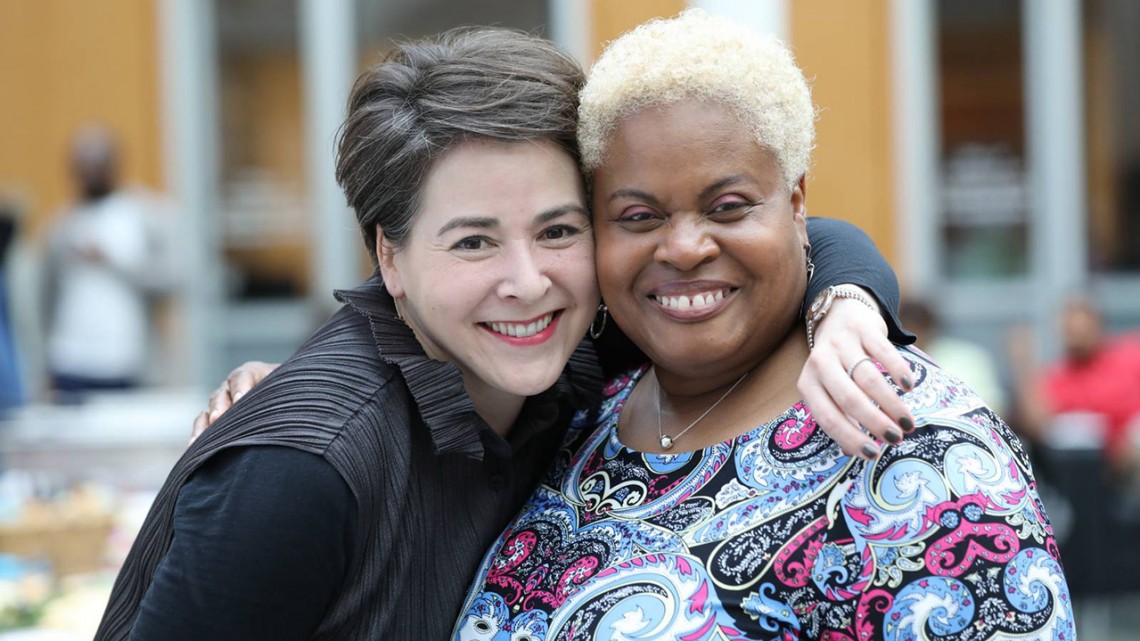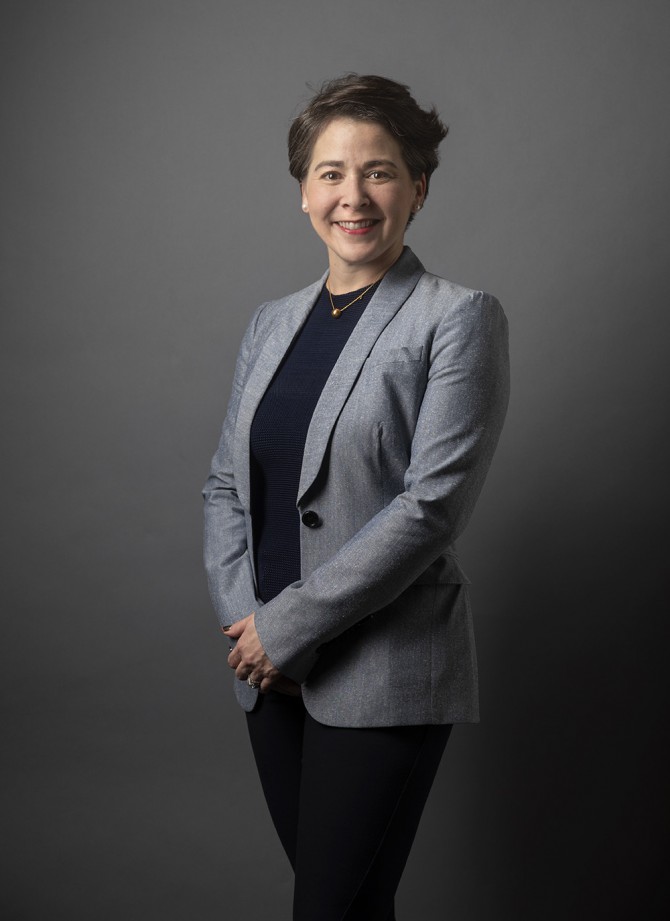
Lisa Nishii, left, with Vanessa Lillard, assistant director at the Office of Academic Diversity Initiatives, at an OADI senior celebration event in May.
Vice provost connects the dots to shape academic experiences
By Joe Wilensky
Lisa Nishii, associate professor of human resource studies in the ILR School, became Cornell’s vice provost for undergraduate education (VPUE) in January. She oversees academic student success and academic diversity programs including the Office of Academic Diversity Initiatives, the Learning Strategies Center and the Intergroup Dialogue Project, along with living-learning initiatives on West and North Campus. Her office also partners with the vice provosts for engagement and land-grant affairs, international affairs and academic innovation.
What part of your new role has the most impact?
The role is really broad – and that’s what attracted me to it. While the schools and departments have responsibility for the core curriculum within the disciplines, this role is about the whole experience for students. It involves representing the needs, interests and success of undergraduate students at the center of the university.
I’m looking at the student experience in a much more holistic way and thinking about the fact that as we prepare this next generation of leaders, they need not only have their deep disciplinary knowledge. Our hope is to have them leave here also having developed a wider set of non-discipline-specific competencies, like an appreciation of cultural difference and human commonality; the ability to work collaboratively in diverse teams; moral and ethical awareness; a deep capacity for empathy; and a sense of personal and civic responsibility.
We want to give them opportunities to develop into the kinds of people who can then go out into the world, continually make connections with other people and with new forms of knowledge, and connect that with what they’ve learned here so they can be adaptive and creative in the way they approach new problems.
Doing this involves thinking about everything from the first-year experience to the co-curricular and extracurricular space. It’s all of these things together with curricular learning that end up creating meaning for their undergraduate experience.
And so it’s having that broad view, trying to connect all the dots, that I find to be an important, and the most fascinating, part of my job.
What are undergraduates’ responsibilities for their education and their Cornell experience, and how do they partner with you?
To get the most out of their education, it’s really important that undergraduates remember a few things:
One is to be curious, and remain curious. Stay open. Don’t rule things out too early. Ask a lot of questions of the people around you (“Why are you interested in what you’re doing?”) and talk to professors (“How did you end up where you are?”). Listen to as many different stories as possible to create as many imaginable paths for yourself, so that you explore while you’re here. Unfortunately, I didn’t fully appreciate until after I graduated from college what a luxury it is to be surrounded by thousands of faculty and staff whose job it is to help you develop and figure things out. Take advantage of it.
Two: Be as resilient as possible. A lot of students experience some form of failure – for the first time, it might feel like – when they’re here, and that’s supposed to happen. That’s how you learn. And so, be kind to yourself, be willing to ask questions, ask for help. But know that everyone is experiencing some version of that.
Three: Have discipline – not just to work hard, but to question your assumptions. Discipline, both to suspend what you think you know and to collect more information. Understanding how it is that people around you see something differently is like a shortcut to expanding your knowledge structures.
Four: It’s easy to name problems. But don’t stop there. Do your research, be informed, ask questions, give people the benefit of the doubt, be constructive. Do your part to be part of the solution and you’ll be happier for it.
Much of Cornell’s approach to the undergraduate experience is described in terms of diversity and inclusion. Why is that framing critical?
I think that diversity and inclusion lens on everything is unavoidable, in that we live in an incredibly diverse world, period. So if we continue to approach things with a monolithic lens, we’re going to fail.
It’s not just about serving a diversity of students who arrive here with very different training and experiences and expectations. It’s also about how that has the power to push us, to encourage us, to inspire us to reflect on what we teach and research and how we do it, so that we can continue to evolve as an institution and to be better at what we do.
For most students, probably all, the community they’ll live in during their time here is the most diverse, culturally rich milieu they might ever experience in a concentrated way.
Ideally, they will emerge from these experiences transformed by that, with a broader view of the world, and an understanding of the diversity in it, that prepares them to be global leaders.
As an ILR School professor and an expert on inclusion in organizations, how has your background prepared you for this position?
In many ways, this has been an application and a natural extension of everything I’ve been studying and thinking about as a social science researcher. There is a lot of relevant social psychology and sociology in the way I think about the student experience and the way students are interacting and learning.
It also influences the way I look at evidence and why I take a data-driven approach to how we construct the undergraduate experience.
What collaborations and partnerships does your office spearhead?
In the classic Cornell way, there are just so many things that aren’t any one unit’s responsibility, so it’s all about collaborating across boundaries. For example, collaborating with the vice provost for academic innovation, we look at how the way we teach influences how students learn, and also their efficacy. We are exploring how pedagogical strategies can actually eliminate achievement gaps, especially in the large intro courses that are the launching point for so many different majors. We partner with the individual colleges and departments to make sure we’re providing all the advising support that students need. We also collaborate with the vice provost for international affairs to help more students consider opportunities abroad and with the vice provost for engagement and land-grant affairs to expand student participation in community-engaged learning.
I also work closely with Vice President for Student and Campus Life Ryan Lombardi and Dean of Students Vijay Pendakur to help shape student experiences – in the classroom, outside the classroom and in their residential communities.
How has serving as a co-chair of the President’s Task force on Campus Climate affected your approach to your other roles at Cornell?
It’s been a phenomenal experience. And I’m really happy that it coincided with the beginning of this role, because for the task force, I spoke with so many different individuals, groups and units from across the university. It has really helped me to develop a broader understanding of all the parts, the complexity that is Cornell. And it has helped sensitize me to what issues students, faculty, and staff are experiencing right now.
Inevitably, a good number of the things that I think will come out of the task force are going to intersect with my role, which I am looking forward to.
The living-learning interface is a really important part of the undergraduate experience, and I think it also will be a really important part of many of the actions that we end up taking.
I hope that more and more students – hopefully eventually all – take part in at least one engaged learning opportunity because I think that the best way to develop the capacity to engage across difference is to engage with people whose lived experiences and perspectives are different.
What do you hope to accomplish over the course of your term, and how will you measure success?
One thing that we heard more often than I expected to hear in all of our outreach for the task force is: what are our core values, and what makes Cornell distinctive? We have certain mottos, but what do they truly mean for you, for me, for the undergraduate – what does it look like to embody those values?
I would love for us, collectively in the near future, to get to a place where we have a crisper understanding of that and let that guide and shape the way we approach undergraduate education.
Providing this clarity of vision, and values, as the basis for defining a distinctive and meaningful undergraduate experience will be really important and helpful – to create better cohesion, connective tissue, glue, for students to make sense of this really enormous array of opportunities and what it means for each one of them to be a Cornellian.
Also, over the next few years, I think we really will have the opportunity to develop a more data-driven understanding of how to shape student success and well-being, and in more nuanced ways. I’d like for us to develop a deeper understanding about who is choosing to study abroad, seek community-engaged learning opportunities, conduct research, or get involved in student leadership – when, why and to what effect? What are the best catalysts for developing those profoundly meaningful connections with academic mentors, the kind that people talk about when they look back at their student experience?
I also want to know more about the middle slice – those students who on paper appear to be doing fine, but maybe aren’t fully engaged. How can we better lead them to new discoveries about themselves, about what they feel passionate about, and nudge them in ways that help them become more resilient and confident?
What do you want alumni to know about what Cornell is doing to help set the stage for student success?
I don’t know if it’s a generational thing, or maybe the task force has made it salient for me, but there’s a really big need for us to teach our students about the value of engaging in real dialogue. And I mean in person, not through social media or after the fact.
I worry that some people think that all this talk about engaging difference – whether it’s different people or different ideas – is something that only people who care about diversity find relevant.
But it’s much more fundamental than that; it’s a societal need. It’s about being human. I know it might sound corny, but you can’t be a good, effective lifelong learner without it.
We, faculty and staff, together with alumni, need to model that.
I hear alumni say a lot: Use us, engage us, we want to come back. How can we participate?
I would love to engage alumni in more informal discussions with students, about their life paths and big lessons. Their pivotal “aha” moments. Help students realize all the ways in which being open will enrich their lives. And all the other competencies that we hold dear as Cornellians, too. I want to look for more of those opportunities.
Cornell has a new platform for connecting students with alumni: cuelinks.cornell.edu. Please join the more than 1,000 alumni who have already signed up!
Media Contact
Get Cornell news delivered right to your inbox.
Subscribe


